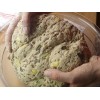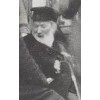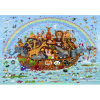
כי לא על הלחם לבדו יחיה האדם For life is nourished by more than bread alone Vayeitzei 5775 © Rabbi David Lapin, 2014 What the Midrash Means Series - 1:7 Context About to cross the border of the Holy Land on his way to Haran in flight from his raging brother, Ya’acov takes a nap on the spot which, unbeknown to him at the time, was to become the Temple Mount. The dazzling beauty of the ladder dream tends to eclipse the deep experiences of Yaacov when he awoke. Shocked that he had slept in so holy a place he marks the spot and makes an oath: If he, Yaacov, is able to retain his ..















